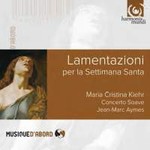
Lamentazioni per la Settimana Santa
 $19.00
Low Stock
add to cart
$19.00
Low Stock
add to cart
VARIOUS COMPOSERS
Lamentazioni per la Settimana Santa
Maria Cristina Kiehr (soprano) & Jean-Marc Aymes (organ & conductor) / Concerto Soave
[ Harmonia Mundi Musique d'abord / CD ]
Release Date: Monday 29 July 2013
Should this item be out of stock at the time of your order, we would expect to be able to supply it to you within 2 - 5 business days.
The sacred music on this disc -- settings of texts for Holy Week, from the early seventeenth century and influenced by the new monodic style -- has long been less familiar than the fiery secular music of the era. One may admire this recording by Argentine-born Baroque specialist Maria Cristina Kiehr and still understand why that is: the composers included here, several of them very famous names, offer a rather scaled-down version of operatic monody to fulfill the requirements of church music, even when it came to the profound Lamentations of Easter week. The holy Wednesday, Thursday, and Friday mentioned (in French) in the tracklist are actually, if you were wondering, Thursday, Friday, and Saturday; apparently there was a tradition of designating such works, which were sung at Matins services, with the name of the previous day. The overall sound of this recording has a shimmering, slightly diffuse quality, with the basic sound laid down by the triple plucked strings of the continuo group (harp, archlute/chitaronne, and lirone) and emphasized by the use of the rare claviorganum organ-harpsichord hybrid. But the real attraction is Kiehr's voice. It is pure, spiritually intense, somewhat piercing, yet extremely graceful, and although it achieves some very agile effects as it shifts from register to register, it doesn't change much from work to work. This seems to be intentional (Kiehr has sounded quite different on other recordings), with the intention being to create a meditative effect. To this end, Kiehr is kept at a distance from the microphone; if you approach the recording expecting to be up close to the singer as is usual with early Baroque opera, you get something quite different, and rather haunting. Variety is provided by the insertion of instrumental pieces, including one unusual one by Palestrina. Full translations of the Latin texts into French, English, and German are given in the booklet, and the listener's reaction to the music may well come down to whether or not he or she has a tendency to engage with it strongly in the first place -- it will be either sublime or rather plain. The recording certainly fills a hole in the overall recorded repertoire of sacred music. (Allmusic.com)